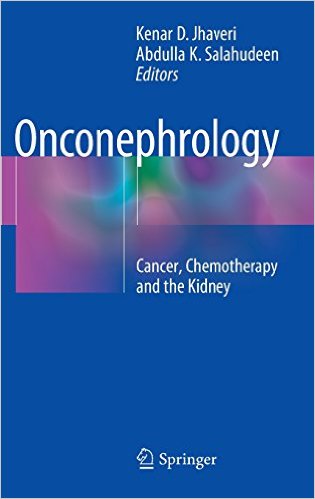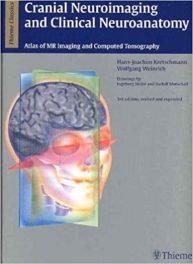 Editors: Kenar D. Jhaveri, MD; and Abdulla K Salahudeen, MD
Editors: Kenar D. Jhaveri, MD; and Abdulla K Salahudeen, MD
Publisher: Springer – 376 pages
Book Review by: Nano Khilnani
Of the 56 million people who died worldwide of all causes in 2012 according to the World Health Organization (WHO), 8.2 million or 14.6 percent were due to cancer. There were more males than females: 4.7 million or 57 percent males compared to 3.5 million or 43 percent females. These numbers exclude melanoma or skin cancer.
The 8.2 million deaths in 2012 compares to 14.1 million new cancer cases reported in the same year. This does not mean that 58 percent (8.2 divided by 14.1) died, because those deaths were from all those who were found to have cancer in 2012 and all previous years.
Among types of cancers, nearly 1.6 million or almost 20 percent of all cancer deaths worldwide were due to lung cancer, which accounts partly for more males overall than females contracting cancer. The No.2 cancer killer was liver cancer with almost 750,000 victims or over nine percent of the total.
The next three were: stomach, bowel, and breast cancers, with 725,000, 695,000, and 525,000 deaths, respectively, or 8.8 percent, 8.5 percent, and 6.4 percent. In sum the top five cancer killers accounted for roughly 4.275 million deaths or about 52 percent of all cancer deaths worldwide in 2012.
The other parts of the human body that were affected by cancer (in order of number of deaths) were: esophagus, pancreas, prostate, cervix, blood, non-Hodgkin lymphoma or NHL, brain, bladder, ovary, lips, kidney, pharynx, larynx, myeloma, uterus, and others,
This book is about kidney disease in patients with cancer, not just about kidney cancer. In 2012, about 145,000 people died of cancer of the kidney, which is 1.7 percent of the total 8.2 million cancer deaths.
Thirty-six doctors working in hospitals and schools of medicine around the United States authored the 17 chapters that constitute this book. We name them below to give you an overview of its contents:
- Acute Kidney Injury (AKI) in Cancer Patients
- Chronic Kidney Disease (CKI) in Cancer Patients
- Glomerular Diseases Seen with Solid Tumors and Hematological Malignancies
- Nephrotoxicity of Chemotherapy Agents
- Biological Cancer Therapies and the Kidney
- Rational Dosing of Chemotherapy in Patients with Kidney Failure
- Electrolyte Disorders in Cancer Patients
- Tumor Lysis Syndrome
- Surgical and Medical Options in the Management of Renal Cell Carcinoma
- Renal Cell Carcinoma and Chronic Kidney Disease
- Renal Disease Following Hematopoietic Stem Cell Transplantation
- Radiation Nephropathy
- Dysproteinemias and Kidney Disease
- The Amyloidoses
- Obstructive Renal Disease in Cancer Patients
- Cancer in the Kidney Transplant Patient
- Cancer, Palliative Care, and Acute Kidney Injury: The Hard Decisions of Offering or Not Offering Dialysis
The editors point out that patients with other cancers, those who have cancer with kidney disease have “a worse prognosis with higher mortality and morbidity.” Onconephrology is a relatively newer cancer subspecialty than others that aims to understand and treat complex renal problems.
An onconephrologist works with a hematologist and an oncologist to treat patients with kidney disease who have cancer.
They state that some patients with cancer have acute and chronic renal insufficiency, and much has to be still learned about preventing acute kidney injury (AKI) in those people, as well as managing anemia, bone disease, and hypertension, among other problems, in them.
Among other problems this book addresses are: amyloidoses, biological cancer therapies, chemotherapy agents, chronic kidney disease, dysproteinemias, electrolyte disorders, glomerular diseases, myeloma cast nephropathy, nephrotoxicity in various instances, radiation nephropathy, renal cell carcinoma, and tumor lysis syndrome.
Editors:
Kenar D. Jhaveri, MD is an associate professor of medicine in the Division of Kidney Diseases and Hypertension, at Hofstra North Shore LIJ School of Medicine in New York. He is an attending physician at North Shore University Hospital and Long Island Jewish Medical Center, both in New York.
He is the core faculty member of the medical school and the Department of Internal Medicine. Dr. Jhaveri’s clinical interests are in taking care of patients with renal complications following bone marrow transplantation and chemotherapy (onconephrology).
Abdulla K Salahudeen, MD, MBA, FRCP is with the Nephrology Section of General Internal Medicine at the University of Texas Anderson Cancer Center. He joined the Nephrology Department at the University of Minnesota in 1988 as a fellow. He has been in academic medicine since then moving up to a full tenured professor about 15 years ago when he was at the University of Mississippi Medical Center.
He maintained active research both at bench and clinical levels funded through extramural sources that included several instances of National Institute of Health (NIH) funding including one for his seminal work on the mechanism of kidney injury during cold storage.







